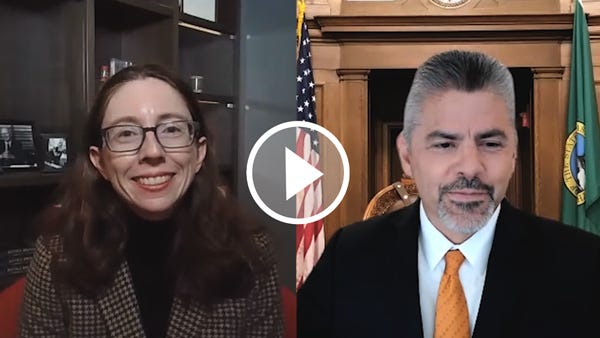State Court Report: Originalism and abortion are on trial in the states
Idaho and South Carolina reveal deep disagreements on constitutional interpretation.
Welcome to the January edition of State Court Report.
Earlier this month, state high courts in South Carolina and Idaho issued major abortion rulings on the same day, one striking down and one upholding its state’s abortion ban. Both cases were decided on state constitutional grounds. This judicial whiplash in a single day is a striking example of how Dobbs v. Jackson Women’s Health Organization has led to an abortion rights patchwork across the country.
The cases also reflected two dramatically different approaches to constitutional interpretation, as my Brennan Center colleague Alice Clapman writes in an insightful piece for State Court Report. In Dobbs, the Supreme Court grounded its ruling in the argument that the right to abortion is not “deeply rooted” in the history and traditions of the United States. The Idaho Supreme Court echoed this originalist reasoning in its own decision upholding Idaho’s near-total abortion ban, looking to the laws and regulations in effect in 1889, the year that Idaho became a state.
By contrast, as Clapman explains, the South Carolina court relied on history to challenge the relevance of original intent to constitutional interpretation. There, the court was considering a right to privacy provision that had been added to the state constitution in 1971. Rejecting arguments that it should look to the intentions of the committee that proposed the amendment, the court, in a plurality opinion, said that such an approach “ignores, and arguably perpetuates, the societal landscape” of that time.
South Carolina didn’t ratify the 19th amendment until 1969. It gave women the right to serve on juries in 1967. Women didn’t have a seat at the committee table when the amendment was first considered — and in the court’s view, that was “highly relevant” to how much weight to give to the committee’s perspective.
Together, Clapman argues, the dialogue between the South Carolina and Idaho decisions “touches on deep questions about democracy: who gets to exercise power, whose concerns are deemed fundamental, and how courts should apply constitutional norms of liberty and equality that were articulated by exclusive bodies embedded in societies that condoned inequality.”
Looking forward, I’ll be watching how other state courts grapple with the role of history in understanding their constitutions. State courts are not bound to embrace the same approach to constitutional interpretation as the federal courts. And often state constitutions, most of which are newer than the federal constitution and all of which are more easily amended, raise different (and sometimes difficult) interpretation questions. In Kentucky, for example, the state supreme court will decide whether and how the defeat of an anti-abortion ballot measure in November should impact how it interprets the rest of its constitution with respect to abortion rights.
I’ll also be looking at how the South Carolina legislature responds to the state supreme court’s abortion ruling. There are troubling rumblings that lawmakers may seek more influence over the judicial nominating commission that currently vets and produces a short list of judicial candidates. The Brennan Center has documented how controversial state court rulings can lead to this kind of targeting of courts, giving more power to the political branches of government and undermining judicial independence. With the rising profile of state courts, expect more such fights in the months and years to come.
Meanwhile, Justice Kaye Hearn, the author of the lead opinion, will be stepping down shortly due to a mandated judicial retirement age. Two of the three candidates to succeed her, both women, have withdrawn due to lack of support in the legislature. If the remaining candidate, Judge Gary Hill, is confirmed, South Carolina will be the only state in the country without any women on its highest court. It’s a striking coda given the emphasis in Hearn’s opinion about women’s historical lack of representation in seats of power.
Chief Justice Steven González Shares Judicial Perspective
Chief Justice Steven González of the Washington Supreme Court joined the Brennan Center for a wide-ranging interview. We discussed originalism, the Washington Supreme Court’s role in protecting rights, the importance of having diverse life experiences on the bench, and González’s own judicial path. He also responded to Chief Justice John Roberts’ famous comment that judging is like calling balls and strikes: “I think it's incomplete, because . . . we're actually defining what the strike zone is.” READ MORE or WATCH
State Preemption Takes Center Stage
From abortion rights to gun regulations to pandemic emergency health orders, the question of when state laws can preempt local ones is an increasingly hot topic. Professor Martha Davis from Northeastern University School of Law gives an overview of state preemption doctrine and analyzes three recent cases that apply its principles. “As political polarization has increased across the country,” she writes, “state preemption has been used more aggressively.” READ MORE
Lessons from North Carolina Voter ID Ruling
In December, the North Carolina Supreme Court ruled that a 2018 state voter ID law violated the state constitution’s Equal Protection Clause. Robyn Sanders analyzes the ruling, which “is significant for both its articulation of a robust state-level equal protection guarantee and its fact-sensitive review of the evidence of racial discrimination.” At the same time, a new conservative majority on the court means that the “durability of the . . . decision remains to be seen.” READ MORE
What the ‘Independent State Legislature Theory’ Case Could Mean for State Courts
During the U.S. Supreme Court’s December argument in Moore v. Harper, several justices expressed skepticism that state legislatures have untrammeled power to regulate federal elections. At the same time, they explored ways that the Court could grant itself new power to review state court rulings. Ethan Herenstein and Thomas Wolf discuss the implications of this potential outcome. “Depending on how the Court defines this power,” they write, “Moore could transform the relationship between state and federal courts in election cases, posing a whole new set of risks.” READ MORE
What Else We’re Watching
Understanding Wisconsin’s Supreme Court Election: A panel on states’ use of judicial elections in advance of Wisconsin’s February primary, hosted by the State Democracy Research Initiative and the Elections Research Center at the University of Wisconsin–Madison. You can join live or via zoom on February 17 from 2:30 to 3:30 p.m. CT. Learn more and register here.
Notable Cases
Watkins v. Ackley, Oregon Supreme Court
Retroactively applied Ramos v. Louisiana, where the U.S. Supreme Court held that the Sixth Amendment requires unanimous jury verdicts to convict a defendant of a crime. Read more in Reason.
Mack v. Williams, Nevada Supreme Court
Ruled that a private right of action for money damages exists under the Nevada Constitution to vindicate violations of search-and-seizure rights and that no qualified immunity defense applies to such an action. Read more from 2News.
TWISM Ents., L.L.C. v. State Bd. of Registration for Professional Engineers & Surveyors, Ohio Supreme Court
Ruled that Ohio courts are not required to defer to an administrative agency’s interpretation of state law, declining to embrace a state analog to Chevron deference. Read more in Reuters.
Rowe v. Raoul, Illinois Supreme Court
Stayed the implementation of the Illinois Pretrial Fairness Act, which eliminates cash bail, while an appeal of a lower court ruling that the act violates the state constitution is pending. Read more in Crain’s Chicago Business.
Brandt v. Pompa, Ohio Supreme Court
Ruled that a state law capping compensatory damages for noneconomic losses violated the state constitution, as applied to claims of child sexual abuse posing severe psychological injuries. Read more in the Ohio Capital Journal.
Commonwealth of Kentucky v. Johnson, Kentucky Supreme Court
Ruled that a tax credit for donating to a private school tuition program violated the state constitution’s bar against raising money for non-public schools without voter approval. Read more in the Courier Journal.





